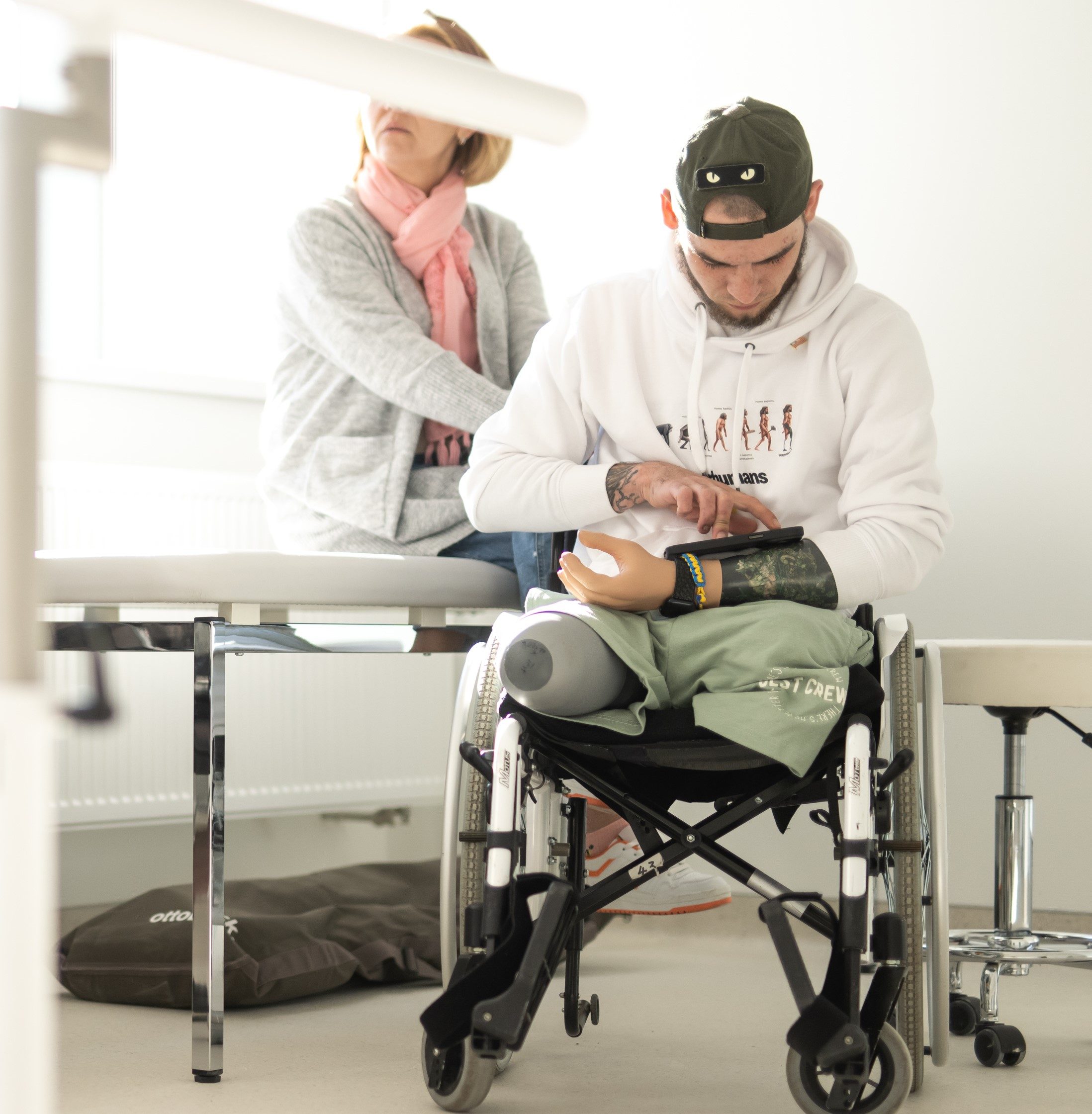Jack of all trades
Fiona Wheeler, Mathew Page and Roberta Hook reveal the highs and lows of life as a Chief Operating Officer
“A bit of everything,” is how Fiona Wheeler describes her job as Chief Operating Officer (COO) at Barking, Havering and Redbridge University Hospitals NHS Trust (BHRUT). “I’m responsible for the daily running of the hospital, from helping set the strategic direction, creating the right environment for the Trust to deliver on targets, providing quality information based on local knowledge to the hospital board, to coaching, mentoring and supporting those delivering patient care, and watching spending.”
Core to her role is ensuring the Trust’s A & E departments perform efficiently 24/7 and that patients are safe and happy, as well as being the go-to for potential emergencies as part of Emergency Preparedness, Resilience, and Response (EPRR). “With the recent social unrest [we spoke to Fiona shortly after the July riots], for instance, my job was to step up the team to ensure they were ready to respond,” says Fiona.
As one of the voices of the Trust externally, Fiona has also been the person to get asked “Why aren’t you performing well?” and “What are you doing about it?” Moot questions given that, when she arrived, BHRUT had been in special measures for more than a decade.
“I had to design a detailed, far-reaching improvement programme without throwing the baby out with the bathwater,” she explains. Gaining the respect and trust of staff was essential to keep them on side. “I spent lots of time talking, listening and explaining why change was necessary,” she observes.
Teamwork matters
BHRUT came out of special measures in May and Fiona was recently appointed Deputy Chief Executive, reflecting the part she has played in getting it back on track. It’s a far cry from her first NHS post as secretary at King’s College Hospital, a job she took largely because the hours fitted in with picking up her toddler from nursery. She has risen through the ranks since via a series of operational leadership roles at the Royal Marsden, Kings College and Croydon hospitals, as well as running her own freelance management consultancy.
“It’s important to recognise you’re part of a team, not an individual, and that you know your services inside out,” says Fiona, who is currently collaborating with local bodies to create a more joined-up ‘place-based’ system. “Together with GPs, council leaders, social services and community health care providers, we are working to co-design a seamless patient experience, not only throughout their lives, but also from home to hospital.”
Community engagement
Community engagement is also at the heart of Mathew Page’s role as COO at the Avon and Wiltshire Mental Health Partnership NHS Trust (AWP). As one of the larger specialist mental health NHS Trusts with an annual turnover of £330 million and around 5,000 staff, his portfolio extends across all mental health services in Avon and Wiltshire, as well as several regional services and specialist services such as learning disability, substance misuse, and so on.
A week’s work experience in a Residential Learning Disability Unit as a 15-year-old set Mathew on the path to a lifelong career in mental health. “The first people were coming out of the big Victorian hospitals into the community at that time,” remembers Mathew, who was inspired to train as a nurse. By 24, he was Ward Manager of a new low secure unit in Gloucester, moving from there into management roles including the transformation of a child and adolescent mental health service before joining AWP as Deputy Director of Operations and, for the last six years, COO.
“A typical day can range from routine governance meetings, looking at the quality of services, system delivery and financial controls to meetings around specific projects and management supervision. We’re currently involved in a big project around flow management through our acute wards. There’s also usually some unforeseen dynamic problem. I’m also in regular contact with partner agencies, including the police, who are often the first line when someone gets into difficulty in the community.”
Thanks to the Trust’s investment in this relationship, it is largely achieving the aims of the national Right Care Right Person initiative that aims to ensure people in need get timely support from the most appropriate service. “We have a police officer in the ambulance control room to help decide which service to deploy. We also have a mental health rapid response vehicle – a blue light vehicle with a mental health practitioner on board – to go to incidents,” explains Mathew
A change for the better
Mathew cites the pandemic as a turning point. “I came out of a meeting with the Director of Nursing discussing infection control to find a team member holding a letter saying we’re activating a national major incident. We changed the entire operational model of the Trust in 24 hours.”
Difficult though this was, it has, he admits, led to some changes for the better. “We’ve eliminated a lot of travelling and made better use of time. It also helped us appreciate the value of different kinds of leadership on a spectrum from ‘command-and-control’ through management to trying to create the right kind of space for people to thrive.”
Today, a key focus is recovery of service delivery and performance, especially around waiting times and spending. “We came out of the pandemic with high levels of need in some specific areas, such as eating disorders. Investment in additional resourcing in the form of clinicians and voluntary sector organisations working closely with service users and their carers has brought our waiting list down from 500 to just 40.”
His biggest current challenge is implementing the new community mental health framework. “It’s about thinking differently, reducing stigma and intervening early. Not everybody needs a doctor or nurse. For example, green social prescribing is brilliant for people with mental health issues,” he observes.
Transformation is key
Looking ahead, Mathew points to the need for service transformation to ensure the NHS reaches the most vulnerable in the context of growing need. “Mental health clinicians are trained to look at disease. We need a shift in thinking to health promotion and prevention.”
Tapping into the digital revolution will be vital. “A digital solution that can be accessed straightaway by someone who is comfortable using digital technology could free up clinicians to support, for example, a homeless person with chronic psychosis.”
He also highlights the necessity for the NHS to cater better for groups who have not been well served due to cultural or language issues. “We need to allow people to be agile and flexible by working with local communities and voluntary and community organisations. We can’t bolt things down and insist on them being done in a specific way.”
Embracing diversity
It’s a sentiment that resonates with Roberta Hook, Deputy COO at the Norfolk and Norwich University Hospitals NHS Foundation Trust (NNUH). “Although there has been some progress, the NHS has a way to go to truly support difference. There is still an image of what inequality and neurodivergence look, sound and feel like. As leaders, we have to embrace and model a range of diversity,” she says.
An accountant by trade, Roberta’s career path was far from conventional. Starting as a management consultant at KPMG (a global network providing audit, tax and advisory services), she moved into the NHS as the Programme Director for Critical Care in the NHS England London region, responsible for recovery of critical care services and supporting staff experiencing moral injury during the pandemic and subsequently Operations Director North East London.
She starts her day checking business intelligence platforms and emails, prioritising issues such as a team needing help or anything that needs to be referred upwards. “There are always calls and meetings around how we operate as a system as well as work on performance, strategy, quality and workforce issues, plus meetings for any emerging challenges or requests.”
As co-chair of the Trust’s Black and Minority Ethnic (BAME) Together Staff Network, it is also Roberta’s job to help BAME staff deal with problems or challenges as well to create a platform where their cultural experience and heritage can be shared and celebrated.
The number of medically fit-to-leave hospital patients unable to be discharged because of lack of capacity outside healthcare has been one of her biggest headaches. “At its peak, around 250 patients were in this position. The sickest patients were outside the hospital and there were too many ambulances queuing. We were focused on the patients they could see while system colleagues were sharing the experience of those we couldn’t reach. We had to work out how to care for the sickest patients to reduce the number of patients in hospital becoming deconditioned.”
The solution involved shifting mindsets to review the risk and balance it across the whole patient pathway. “We worked hard with the clinical executives to turn the tide on our urgent and emergency care performance. We used to have some of the longest ambulance handover delays in the country and this was adversely impacting the ambulance service’s ability to respond to patients in the community,” explains Roberta. “We put in a zero-tolerance policy on ambulance delays, which required all teams to shift their mindset to forward thinking to create the space to handover ambulances in the emergency department by ensuring patients were moving forward in a timely manner. It was a seismic shift and, as a result, our urgent and emergency care performance materially improved.”
Although Roberta concedes there are still difficult days, long waits are becoming a thing of the past. “We used to be ranked one of the worst performers of the c.120 Trusts with an emergency department. Now we rank in the top 10 for four-hour ED performance, 90% of our ambulances are handed over in less than 60 minutes, and CAT 2 response time reduced from 56 to 30 minutes in line with the national interim target. We are in the top 20 regarding average time patients spend in ED and the number of medically fit patients continues to reduce thanks to efforts from system partners. We still have work to do to continuously improve, but I’m incredibly proud of what we have achieved.”
Despite these improvements, says Roberta: “There are still too many frail, elderly patients in emergency care who would ideally be cared for in the community. This will become more problematic across the NHS in coming years, and I would like to see NNUH lead the way. From a public health perspective, we need to think about what we tell 20-, 30- and 40-year-olds to help them avoid illness in later life.”
Roberta is keen to make the NHS a more attractive workplace, especially with private companies vying for the healthcare space. “We need to ensure we don’t miss out and think about how to make the financial incentives enticing, as well as making the NHS somewhere all can progress,” she says.
Roberta would also like to see more of a healthcare focus in science and data science programmes to draw new entrants, as well attracting more people of colour to the NHS. “When I was young, nursing was the epitome of a worthwhile job for black people. I’d like to keep hearing and promoting the message that working in the NHS is a valuable way to contribute to society,” she comments.
Fiona attributes the waning of this sentiment partly to an antagonistic media. “There’s lots of pride in the NHS and a huge amount of personal satisfaction from doing a good job for all grades of people. But our efforts are often overshadowed by a negative press,” she says.
For all three, finance is an ongoing challenge. “We are spending public money, so we should be held accountable. But it can be hard to have an optimistic conversation with community healthcare providers about improving healthcare, investing in the right things and developing services when you are chairing hours of financial recovery meetings and holding everyone accountable for money spent,” says Fiona.
All three agree, however, that their job is one of the most rewarding in the health service. Roberta speaks for them all when she says: “The NHS can be a joyous place to work. It is wonderful seeing the results of changes you have put in place and the impact of your work on patient outcomes.”
Lessons learnt
Fiona: Never underestimate the importance of knowing your services and your staff.
You can be anonymous or a known leader, but the most important thing in any NHS leadership role is that the people who work for you believe in and trust you.
Roberta: Keep improvements for patients in sight.
This has to be our guiding principle. You can always bring people along with a patient story or a patient experience.
Mathew: Be flexible.
You have to move between having a strategic ‘helicopter’ view and focusing on the fine detail. This means finding a way to live with a high level of uncertainty because you can’t control everything, and if you try you risk burnout.
Advice for would-be COOs
Roberta: Find your supporters.
In terms of career progression, find the people who are on your side and will talk to others about your achievements.
Mathew: Seize the day.
Take as many opportunities as possible to get involved. Think about how you could lead on a transformational project, for instance. Stretch yourself in the same way you would if you were training for any other discipline.
Fiona: Don’t underestimate how tough the job is.
There is a big workload. You also need personal resilience. But if you want to make a difference, this is one of the best jobs in the health service.
© Dialogue Content Marketing Ltd 2025.
This article was taken from the November 2024 edition of FORTIS magazine.
FORTIS magazine is a Health Spaces Limited publication. Opinions expressed in FORTIS magazine are not necessarily those of Health Spaces Limited or Dialogue Content Marketing Ltd. Material contained in this publication may not be reproduced, in whole or in part, without prior permission of the publishers. No responsibility can be taken on behalf of advertisements printed in the magazine.
FORTIS magazine – read more
This article was written for the November 2024 edition of FORTIS magazine; a forum for the NHS to share ideas, innovations and case studies. To read the publication in full and access digital copies, visit FORTIS magazine. FORTIS magazine is free for NHS change-makers and leaders and is available as a print or digital copy. FORTIS magazine is managed and owned by Health Spaces Ltd.




